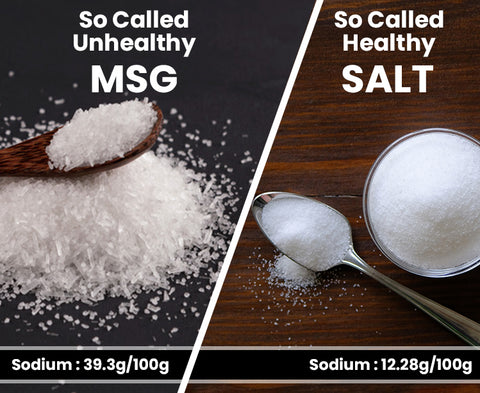MSG in Fast Food: Healthy or Unhealthy?
MSG is controversial for its ill effects on human health and the controversies are as wide as its usage all over the world. Know how Healthy and Unhealthy it is?

Monosodium glutamate (MSG) is a very popular widely used flavor enhancer derived from L-glutamic acid, a naturally occurring amino acid in a variety of food products including fast foods, chips, packaged snacks, ready-to-eat foods, seasonings, frozen food, soups, processed meat, condiments, and kids most favorite instant noodles. 2 It is controversial for its ill effects on human health and the controversies are as wide as its usage all over the world. Therefore, we aim to validate the ill effects of MSG on the basis of updated research.
Here’s what you must know before eating MSG food:
1. Monosodium glutamate (MSG) is popularly known as Ajino moto or China salt. It is a crystalline form chemical that is used as an additive in foods to enhance taste and flavor.

It gives a specific aroma to processed foods which is termed umami in Japan.
The flavor-enhancing effects of MSG induce salivary secretion.1
In other words, umami flavors please your taste buds, which eventually enhances the taste and craving for food.
2. Interestingly, the amount of sodium in the normal table salt we use is 39.34 g/100 g which is 1/3 times more than the sodium content in MSG which is 12.28 g/100 g.7

A simple replacement of ½ teaspoon of table salt i.e. 2.5 g by ½ teaspoon of MSG i.e. 2.0 g reduces the sodium consumption to about 37%.
If you are Hypertensive, which one will you prefer?
3. MSG has been shown to increase satiety when included in a protein diet. Additionally, Inosinic acid, another flavor enhancer in combination with MSG when taken in high-protein sources, may potentially further enhance satiety.3

Soup and related food items contain both the ingredients and therefore, appetite is enhanced with the intake of soup.
4. Ironically, the glutamic acid in MSG is the major nonessential amino acid present in our body.
It is involved in various body activities including providing energy to gut cells, regulation of body metabolism, and even in brain and nerve cells coordination. 4
5. Having MSG-enriched food can have you take few calories in your next meal and thus reduce your calorie intake from non-MSG and high-fat meals.9

6. If you are sensitive to MSG, you may suffer from headaches, giddiness, sweating, abdominal pain, and allergic reaction in the skin within a few hours of consumption of MSG. these symptoms are collectively referred to as Chinese Restaurant Syndrome.
7. Overdose of MSG can impair your glucose tolerance and insulin resistance. This can positively increase your body mass index (BMI) can make you obese.5,6

8. MSG has been alleged to trigger asthma. Although there are very few reports in which MSG sensitivity is linked to asthma and the results are conflicting.
But in a case study conducted on 12 asthmatic subjects with an age of 35 yr on average, no responsiveness against MSG was demonstrated which justifies the fact that MSG does not triggers asthama.8
9. But Can it cause Reproductive Abnormality in Males?

There is a scarcity of data on the evaluation of MSG intake in human male reproductive.
But the studies reported on male rats are worth consideration. These studies have reported MSG-induced reproductive dysfunctions including a low sperm count, high sperm abnormality, reduced live sperm and decreased sperm pH, oxidative damage, and imbalanced male sex hormones.10
10. Despite its ill effects, the US Food & Drug Administration (USFDA) and FDA have recognized MSG as a food ingredient to be safe (GRAS).
Yet, doctors and dieticians are of the common opinion that excessive and regular consumption of MSG foods can have a potentially dangerous long-term effect on our health.
Based on the above facts, MSG is safe and completely metabolized in your gut and serves as an energy source to keep you working. Yet it's recommended to consume it occasionally or its daily intake should not exceed 3 gm.
Click to know What's the Nutritional Value of Your Daily Snack and Your Favorite Street Food?
